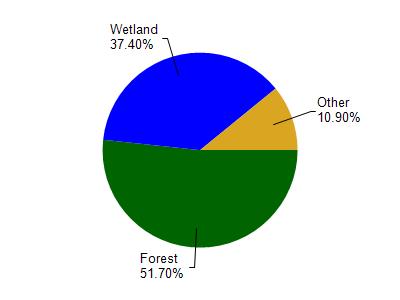Price
No
No
No
Fish and Aquatic Life
Historical Description
Source: 1983, Surface Water Resources of Price County Solberg Lake T38N, RIE, Sec. 16, 20, 21, 28, 29.
Solberg Lake is a soft water, drainage impoundment on Squaw Greek. There is a 15-ft head dam on the outlet that is owned and maintained by Price County. The lake has an estimated outlet flow of 14.4 ft (3)/sec. Solberg Lake is long and has an irregular shoreline with 11 islands scattered throughout the lake. Muskellunge, walleyes, perch, largemouth bass, black crappies, pumpkinseeds, black bullheads, white suckers and minnows make up the fish population. Besides Squaw Creek, the lake receives flow from Disappearing Creek on the west side and three unnamed feeders on the east side. The lake shoreline is 94% upland, 5% sedge marsh and 1% leatherleaf bog. Sand makes up the majority of the littoral bottom with small amounts of gravel; rubble, bedrock and muck. Aquatic vegetation is common throughout the lake with heavy concentration in some bays. In addition, stumps and logs are found along the shoreline. The lake is used heavily by nesting and migratory ducks. Some Canada geese also are found during the fall migration. Furbearer use is unimportant. Private development consists of 3 resorts and 127 cottages and homes. Of the 12.40 miles of shoreline, 2.82 miles are in Price County and Town of Worcester ownership. Price County owns and maintains a park with a public access on the north side of the lake. In addition, the Town of Worcester provides two access sites, one each on the east and west sides.
Surface area = 859.0 acres, maximum depth = 16 ft, MPA = 21 ppm, Secchi disk = 4 ft.
Date 1983
Author Surface Water Inventory Of Wisconsin
Impaired Waters
Solberg Lake (WBIC 2242500) was placed on the impaired waters list for total phosphorus in 2016. The 2018 assessments showed continued impairment by phosphorus; new total phosphorus sample data exceeded the 2018 WisCALM listing thresholds for the Recreation use and Fish and Aquatic Life use. Chlorophyll-a sample data nearly exceeded the REC use thresholds, but clearly met the FAL use thresholds. Based on the most updated information, no change in the existing impaired waters listing was needed.
Date 2017
Author Ashley Beranek
Impaired Waters
This water was assessed during the 2016 listing cycle; total phosphorus sample data exceed 2016 WisCALM listing thresholds for the Recreation use, however, chlorophyll data do not exceed REC thresholds. Total phosphorus and chlorophyll data do not exceed Fish and Aquatic Life thresholds.
Date 2015
Author Aaron Larson
Condition
Wisconsin has over 84,000 miles of streams, 15,000 lakes and milllions of acres of wetlands. Assessing the condition of this vast amount of water is challenging. The state's water monitoring program uses a media-based, cross-program approach to analyze water condition. An updated monitoring strategy (2015-2020) is now available. Compliance with Clean Water Act fishable, swimmable standards are located in the Executive Summary of Water Condition in 2018. See also the 'monitoring and projects' tab.
Reports
Recommendations
Aquatic Plant Management Plan
The Solberg Lake Association will conduct a two phase aquatic plant management project. This grant will fund phase II of the project. Phase II will include the development of a aquatic plant managment plan which will include a definition of the problem, goals, explaination of plant ecology, various management techniques, and methods to evaluate progress.
Management Goals
Wisconsin's Water Quality Standards provide qualitative and quantitative goals for waters that are protective of Fishable, Swimmable conditions [Learn more]. Waters that do not meet water quality standards are considered impaired and restoration actions are planned and carried out until the water is once again fishable and swimmable
Management goals can include creation or implementation of a Total Maximum Daily Load analysis, a Nine Key Element Plan, or other restoration work, education and outreach and more. If specific recommendations exist for this water, they will be displayed below online.
Monitoring
Monitoring the condition of a river, stream, or lake includes gathering physical, chemical, biological, and habitat data. Comprehensive studies often gather all these parameters in great detail, while lighter assessment events will involve sampling physical, chemical and biological data such as macroinvertebrates. Aquatic macroinvertebrates and fish communities integrate watershed or catchment condition, providing great insight into overall ecosystem health. Chemical and habitat parameters tell researchers more about human induced problems including contaminated runoff, point source dischargers, or habitat issues that foster or limit the potential of aquatic communities to thrive in a given area. Wisconsin's Water Monitoring Strategy was recenty updated.
Grants and Management Projects
Monitoring Projects
| WBIC | Official Waterbody Name | Station ID | Station Name | Earliest Fieldwork Date | Latest Fieldwork Date | View Station | View Data |
|---|
| 2242500 | Solberg Lake | 10012310 | Solberg Lake - Solberg Lake Beach South | 5/4/2004 | 8/30/2010 | Map | Data |
| 2242500 | Solberg Lake | 10005210 | Solberg Lake | 11/27/1990 | 11/29/2025 | Map | Data |
|

Watershed Characteristics
Solberg Lake is located in the Elk River watershed which is 261.12 mi². Land use in the watershed is primarily forest (51.70%), wetland (37.40%) and a mix of grassland (4.70%) and other uses (6.20%). This watershed has 254.00 stream miles, 2,883.84 lake acres and 49,382.72 wetland acres.
Nonpoint Source Characteristics
This watershed is ranked Not Ranked for runoff impacts on streams, Low for runoff impacts on lakes and Low for runoff impacts on groundwater and therefore has an overall rank of Low. This value can be used in ranking the watershed or individual waterbodies for grant funding under state and county programs.However, all waters are affected by diffuse pollutant sources regardless of initial water quality. Applications for specific runoff projects under state or county grant programs may be pursued. For more information, go to surface water program grants.